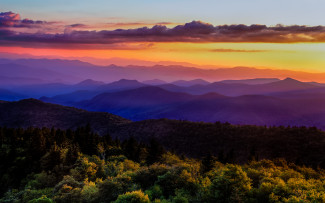
Johns Hopkins UniversityEst. 1876
America’s First Research University
Proving Ground: Expertise and Appalachian Landscapes

Proving Ground: Expertise and Appalachian Landscapes is a book about people who were on the move, a long way from home, and wanted everyone to know it. They yearned for affirmation, and the Appalachian Mountains were the venue through which they found it. I wrote the book to connect a set of questions that have been swirling in my head for more than a decade.
First, I wanted to understand why people traveled (for enjoyment) to dangerous, derelict places. The project began in my thinking about Centralia, PA—the “town on fire”—as a site of abandonment and disaster which attracted increasing numbers of tourists in the Internet age. I drove 50 minutes from my house to get there, and I was far more interested in the three visitors I found when I arrived than in the place itself. They were taking pictures of each other in front of cracked asphalt and weeds. What did they get out of it? What would they tell others about their experience of that middle-of-nowhere landscape?
Second, I tried to figure out how the region of Appalachia functioned for those who were geographically adjacent to the mountains but not residents of the rural uplands. In 2010, I was planning a faculty-led study tour of the mountains of North Carolina, Kentucky, and Tennessee for students at Susquehanna University. Most people I told about the program assumed that it was a service trip. Surely, they thought, this group of college students would build homes, dig ditches, or otherwise improve Appalachian infrastructure. I became interested in the difference between thinking about Appalachia as a region—home to a mix of cultures and narratives—and thinking about Appalachia as a set of conditions—not “home” to anything, per se, but harboring fields in which various groups wield power.

And third, I hoped to discover why many Americans’ leisure time has increasingly straddled the line between creative relaxation and hard work. Steven Gelber’s Hobbies: Leisure and the Culture of Work in America is one of those books that I think about regularly. Gelber’s analysis of the segmentation and routinization of leisure time got me considering how we build “local” forms of authority for ourselves by learning, internalizing, and then disseminating instructions. From there, it was a short hike into studying expertise and the ways in which people proved themselves to peers.
My first book was about a city, so it struck me that this project should be about rural spaces, even if I focused on how those spaces were studied from urbanites’ viewpoints. And I grew up in Pittsburgh, where “Appalachia” means “West Virginia,” and where West Virginia-bashing is, somehow, always in season. I played with that notion of who was inside, who was outside, and just what it was that they were inside and outside of.
Ultimately, Proving Ground filters these ideas through a series of would-be experts who traveled into the Appalachian Mountains, got down to work, and then shared the fruits of their labor with others. It’s a book about departures, returns, and the distances in-between.
Edward Slavishak is an associate professor of history at Susquehanna University. He is the author of Proving Ground: Expertise and Appalachian Landscapes and Bodies of Work: Civic Display and Labor in Industrial Pittsburgh.


